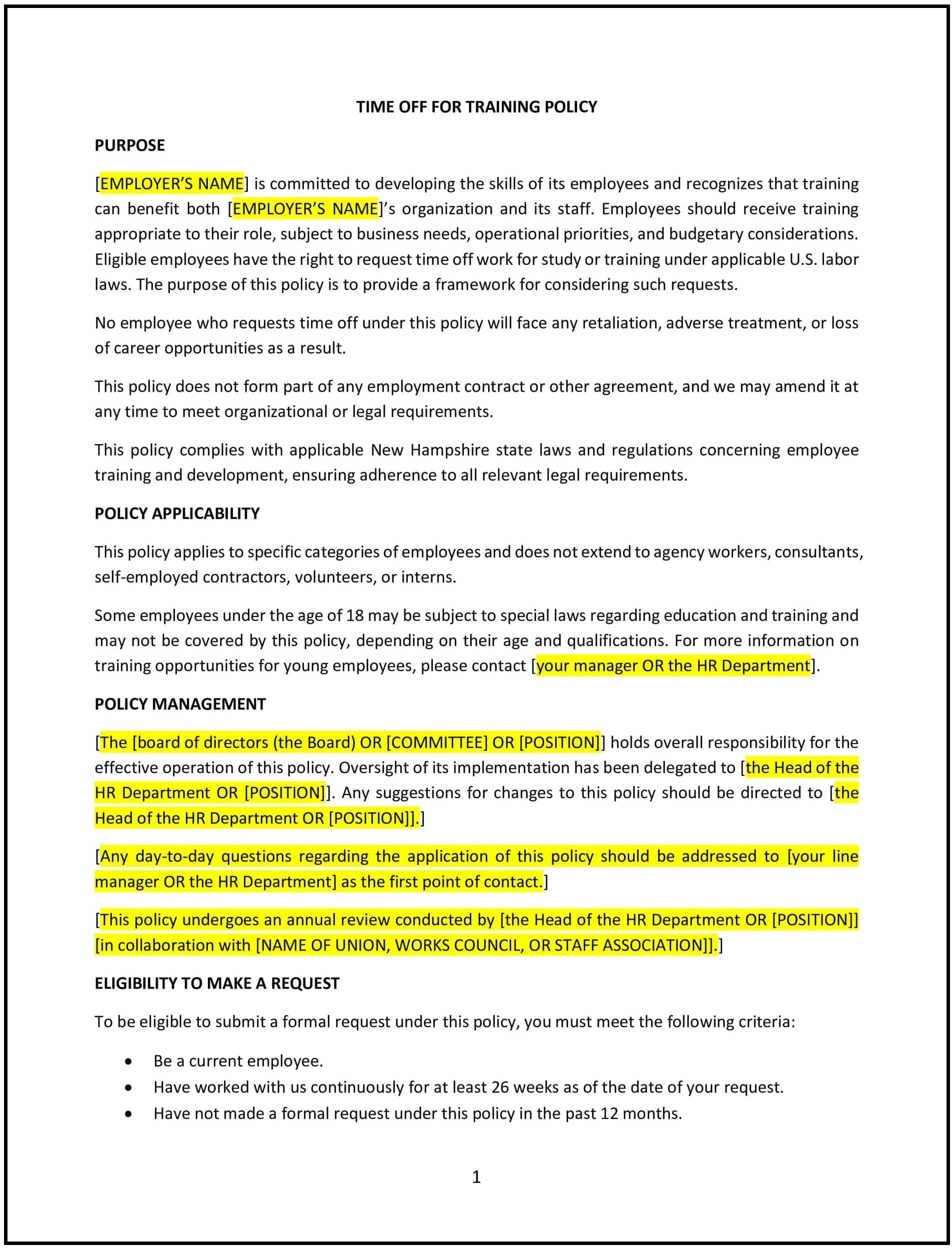Time off for training policy (New Hampshire): Free template
Got contracts to review? While you're here for policies, let Cobrief make contract review effortless—start your free review now.

Customize this template for free
Time off for training policy (New Hampshire)
A time off for training policy helps New Hampshire businesses outline the conditions under which employees can take time off for professional development or training. This policy ensures that employees have the opportunity to improve their skills and knowledge while balancing business operations. It defines the process for requesting time off, the types of training eligible for leave, and whether or not the leave is paid.
By implementing this policy, businesses can support employee growth, enhance skill development, and improve overall workforce performance.
How to use this time off for training policy (New Hampshire)
- Define eligible training: Clearly outline the types of training that qualify for time off, including workshops, seminars, certifications, or courses related to employees' roles or career development.
- Set approval process: Establish a process for employees to request time off for training, including how far in advance requests should be made and any documentation that may be required (e.g., course details, training schedule).
- Determine paid vs. unpaid leave: Specify whether time off for training is paid or unpaid. If paid, outline the compensation terms, such as full pay or a partial stipend.
- Clarify training duration: Define the maximum amount of time off an employee can take for training, whether it's for a specific number of days or the duration of the training program.
- Address job responsibilities: Ensure that employees understand their job responsibilities during training leave, such as notifying supervisors of their absence and coordinating workload management in their absence.
- Evaluate training value: Establish criteria for evaluating the value of the training, ensuring that it aligns with business goals and enhances employee performance or skill sets.
- Maintain communication: Outline the expectations for employees to stay in communication with their supervisor during training, including periodic check-ins or feedback sessions.
- Review and update: Periodically review and update the policy to reflect changes in training opportunities, business needs, or employee development goals.
Benefits of using this time off for training policy (New Hampshire)
This policy provides several benefits for New Hampshire businesses:
- Supports employee growth: Allowing employees to take time off for training encourages professional development, leading to enhanced skills, job satisfaction, and engagement.
- Increases productivity: Employees who acquire new knowledge and skills are more likely to be productive and contribute to the business's success.
- Enhances employee retention: Offering time off for training shows that the company values employee growth and is committed to investing in their career development, helping to retain top talent.
- Promotes business success: By aligning training with business objectives, companies can ensure that employees develop skills that are directly applicable to their roles and organizational goals.
- Keeps the business competitive: A well-trained workforce helps businesses stay competitive by adapting to industry trends, new technologies, and evolving market demands.
Tips for using this time off for training policy (New Hampshire)
- Communicate the policy clearly: Ensure all employees are informed about the policy and understand the process for requesting time off for training, including the types of training that are eligible.
- Provide training resources: Offer resources or guidance on training programs that align with company needs or offer to reimburse training costs to employees who choose development opportunities.
- Encourage continuous learning: Foster a culture of continuous learning by encouraging employees to participate in training and development programs.
- Align training with business goals: Make sure that the training offered is aligned with the business's objectives, ensuring that the knowledge gained is applicable and beneficial to the company.
- Monitor the impact of training: Evaluate the effectiveness of training by tracking employee performance and identifying areas of improvement or growth after completing training programs.